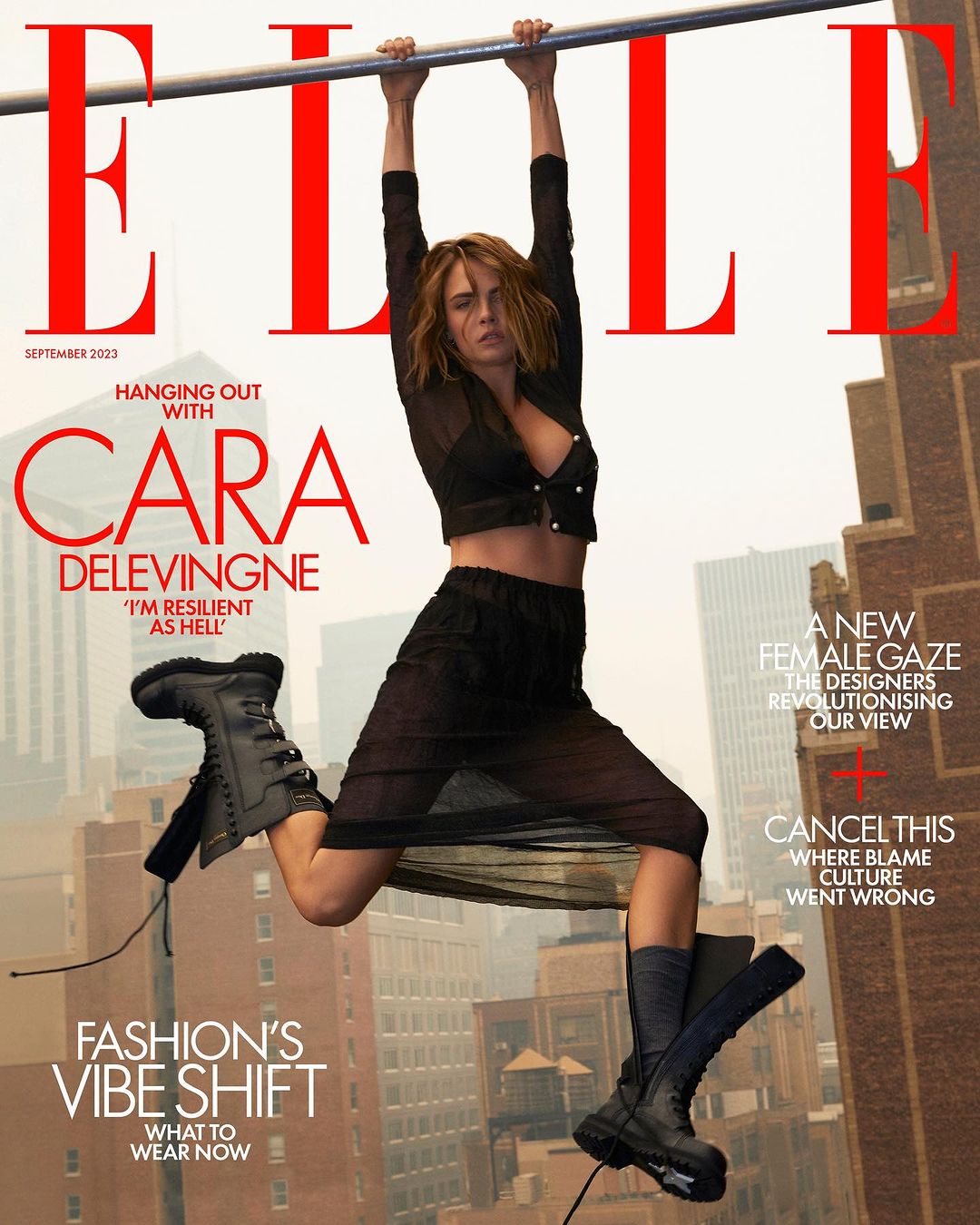Back in March, Cara Delevingne revealed that she had gone to rehab and been sober for months. She was obviously drinking and drugging for years, until she came to a point where she didn’t recognize herself or what she had become. Since she got sober in the fall of 2022, she’s been going to AA meetings and working her 12-step program. I am happy for her, and I’m saying that as someone who never cared for Cara whatsoever. I think her story and journey are helpful for people her age, people who might not realize they have a problem, people who believe that they’re managing their addictions just fine. Anyway, Cara covers the latest issue of Elle UK and it’s a lot like her Vogue cover story months ago. Cara is still bracingly sober and figuring how to enjoy her new sober life. Some highlights:
Sober activities: ‘I’m able to live in a way that I never thought I would be able to, where I can really experience things and engage with them. I never thought I would be able to enjoy anything this much…. It’s been worth every second. I just don’t know what it would take for me to give it up. I am stable. I’m calmer.’ She has learned a lot, she says. ‘That I’m resilient as hell. That anything is possible. I think I used to say that and not believe it. But now I really believe it.’
Her early success as a model: ‘It didn’t feel real. I didn’t feel like I deserved it. I didn’t feel worthy. I was still stuck in this mindset of not being good enough. I was doing the best I could, but I wasn’t really appreciating every moment. Inside, I felt very different to how I looked.’
Her recovery: She started with Alcoholics Anonymous’ 12-steps programme and has a sponsor, as well as support from ‘friends who have been down this path before who have been instrumental in guiding me’. But traditional therapy has never worked for her, she says. Instead, she sees Colin Dunsmuir, her yoga teacher since she was 18, three times a week, over FaceTime. Sometimes they talk, or they might do breathing or chanting: ‘Whatever my body needs. He knows me so well. But honestly, feeding myself creatively is probably the best self-care I can do. I feel like art is therapy to me.’
She didn’t have queer icons to look up to when she was a kid: ‘Not really. Like Billie Jean King, but not until I was older. And Elton and George Michael. And men who pushed the gender boundary like David Bowie and Prince, but not women.’ Representation is important, ‘especially for young people, who feel like they’re alone, to see people who are like them – and to see anyone in the umbrella of the LGBTQIA+ flag. It’s all family.’
Queer joy is important: ‘Now more than ever, in England and in the US. It’s a scary time for queer people. But the more that we’re met with fear, the more joy we have to bring. Because no one can take that joy away, no matter what. We’re not going anywhere.’
The only thing I’m a little bit “eh” about is “traditional therapy has never worked for her, she says.” Not a red flag, but maybe some kind of flag. I suspect that Cara simply doesn’t want to do the work in therapy and unpack a lot of her bullsh-t and her family’s bullsh-t. I was going to criticize the whole “there weren’t gay icons around when I was growing up,” but I think she’s specifically talking about queer women in the public eye, in the UK in the 1990s and early 2000s. Is that the case? I don’t know. Maybe she’s right. Also: I find it hilarious when nepo babies talk about their imposter syndrome. They’ve gotten whole-ass careers from their names, family connections and privilege and once they get to the top of the mountain, they’re like “oh no, this was too easy!”
Covers courtesy of Elle UK, additional photo courtesy of Avalon Red.
- Cara Delevingne arrives on the red carpet of The 95th Oscars® at the Dolby® Theatre at Ovation Hollywood on Sunday, March 12, 2023.,Image: 762312134, License: Rights-managed, Restrictions: , Model Release: no, Credit line: Kyusung Gong / Avalon
















Same Cara, same.
As a bisexual femme, it was a really big deal when Cara and St Vincent were walking around being photographed and I’m reaching mid-40s.
I’m a 45 yo bi femme and yeah, I completely agree with her about representation being lacking. I do think it’s better for Gen Z, thankfully.
Agree. I have a unique history. Therapist are more interested in learning about me than helping me through things.
That’s something they don’t teach them in school. A lot of people become Therapist to fix themselves. They don’t care about the client. I have been giving such bad advice because the therapist wanted to know what would happen. Or they can’t grasp the situation. Also they aren’t that concerned with privacy.
What helped me, I had to get away from the liars and really replay situations with out interference.
Yeah, it’s entirely possible Cara didn’t find a therapist who was right for her. If talking with her yoga instructor three times a week works for her, then great. The first therapist I saw I didn’t really jibe with, but the second one clicked. The best thing for me about seeing that first one was getting over the ‘talking with a stranger about things that really bother me’. Once I was able to get that out of the way, I was able to seek out someone who would work better for me. Honestly, I just don’t see this as a red flag. Good for her for getting sober & doing her best to stay that way.
The therapy comment could be totally understandable depending on any context that either wasn’t asked about or Cara didn’t wish to expand on, but standing on its own, makes it sound potentially dismissive of therapy(even though she said no such thing).
There’s just still too much stigma around therapy and talking about therapy in public for comments like that to stand easily on their own without doing some unintended harm.
I’ll say this, I believe in therapy very much and it’s helped me incredibly. BUT, not every experience or modality was helpful. Like when I was grieving over a friend’s sudden death, I was referred to a talk therapist who was very kind, but who kind of just encouraged me to look on the bright side of life. Which… was not helpful.
And when I was struggling with an eating disorder as a young woman, it helped a little to talk to someone about it, but it wasn’t until I found somatic therapy(which is more body-mind connection instead of talk therapy, where you’re often intellectualizing the issue) that I started to get better.
Here’s to a world where mental health is a normal topic!
This was a really helpful comment, thank you Elizabeth! I don’t like to talk with strangers either so I think Somatic Therapy might be a better option for me. I don’t think there is a one size fits all approach to therapy (just like many other medical treatments).
I actually really like Cara (I know she’s a nepo baby, but in print she’s really an incredible model — she has the same kind of vibe as Daria Werbowy and Sasha Pivavarova), so I’m glad that she’s gotten the help that she needs and seems to be in a good place right now.
People have very different problems and experiences, so why assume one form of therapy is ideal for everyone? I’m different from some of my friends/family who’ve spent years doing traditional talk therapy. I’ve found many productive methods of facing and sifting through my own crap–like journaling, making art that brings me joy and direction, implementing daily structure as well as daily rest, honoring personal boundaries, going on long “thinking walks” by myself in nature. I resonate with Cara’s self-care comment about “feeding [herself] creatively.”
Some people need insight dragged out of them by a trained professional, while others (especially creatives) may innately be quite reflective, expressive and productive. Do what feels necessary and validating, and if you’re unsure how to do that, hire outside help.